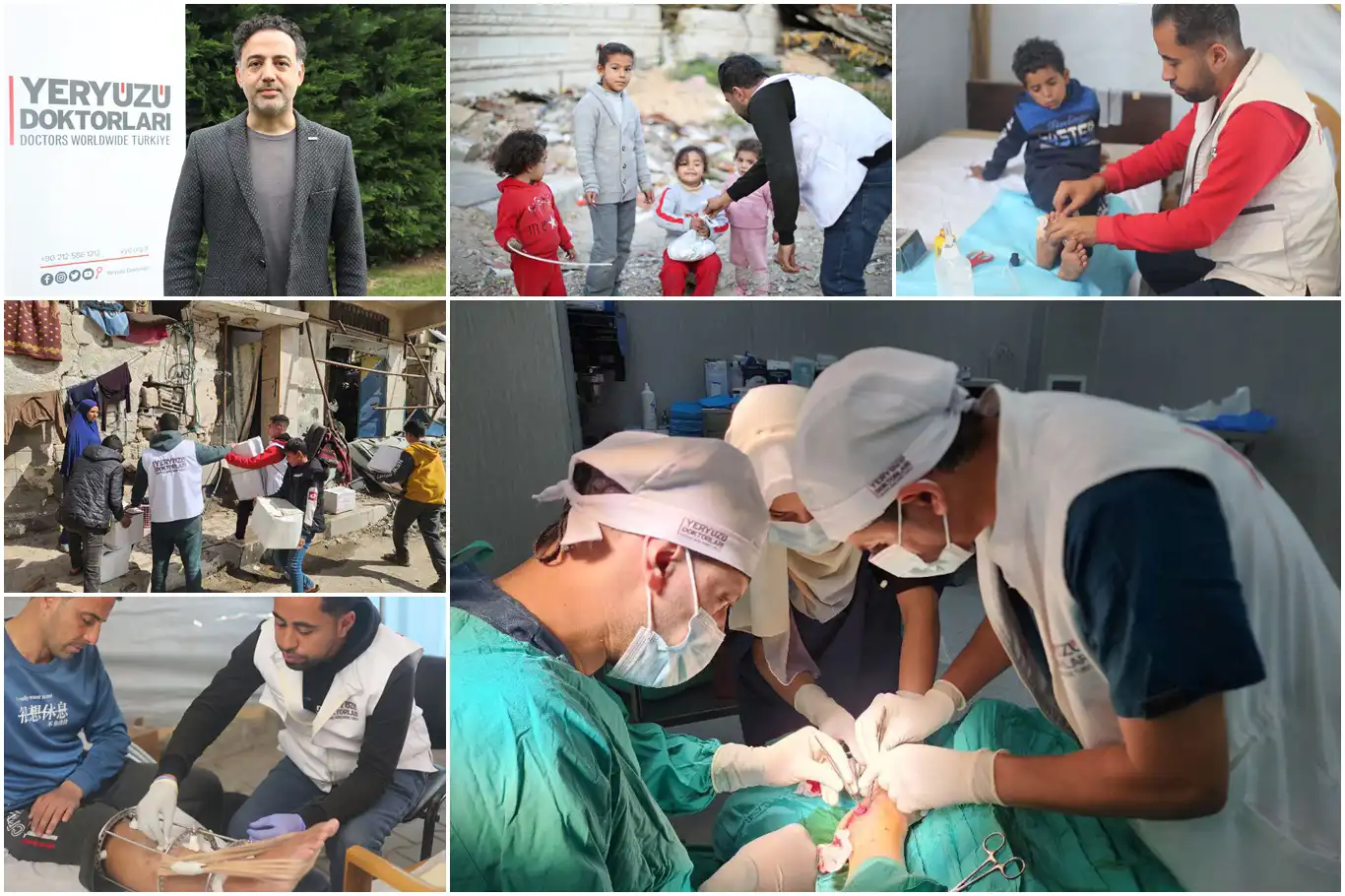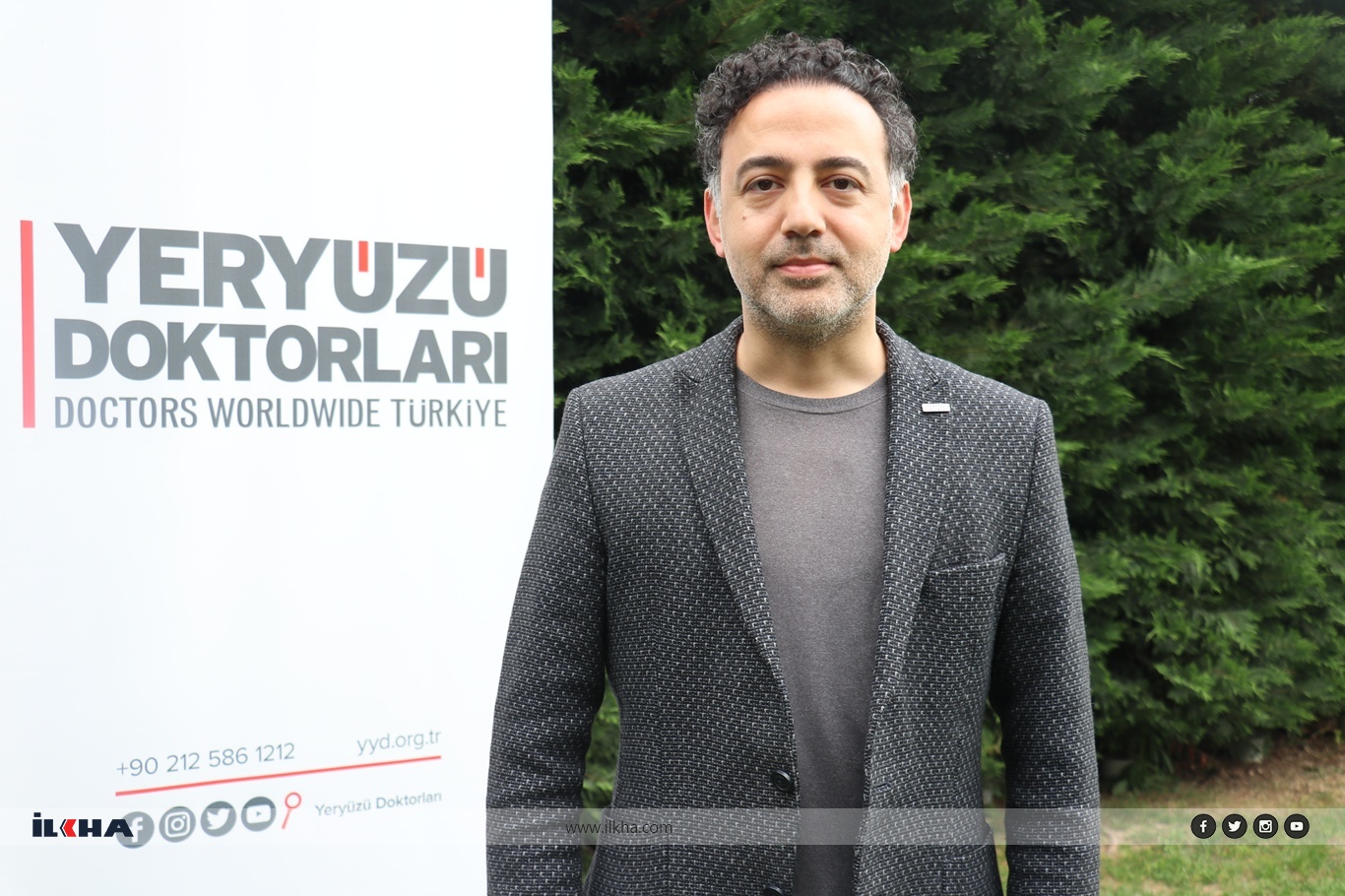Doctors Worldwide: Immediate medical evacuation needed for Gaza patients


The relentless Israeli assault on Gaza has plunged the besieged enclave into an unprecedented humanitarian and health catastrophe, with official figures reporting over 53,000 Palestinians killed and more than 100,000 wounded since the attacks began on October 7, 2023.
Dr. Ahmet Salduz, the President of Yeryüzü Doktorları (Doctors Worldwide), has issued an urgent plea for the international community to allow unrestricted access for health workers and humanitarian aid into Gaza and to facilitate the transfer of critically ill patients to neighboring countries for life-saving treatment.
In an exclusive interview with ILKHA, Salduz painted a grim picture of Gaza’s collapsing health infrastructure, where relentless attacks have decimated medical facilities and left survivors grappling with epidemics, malnutrition, and untreated injuries. “The tragedy in Gaza shows no signs of abating,” he said. “Nearly 55,000 people have lost their lives, and approximately 120,000 have been injured. Of those, 25,000 have suffered severe injuries, including amputations and head trauma, requiring specialized care that is simply unavailable in Gaza.” He also revealed that 1,100 health workers have been killed, and 38 hospitals, 81 health centers, and 164 health institutions have been destroyed, including a medical center operated by Doctors Worldwide.
The destruction of Gaza’s health infrastructure has left the remaining medical facilities overwhelmed and under-resourced. Salduz, whose organization has been providing medical support in Gaza since 2011 and established a permanent office there in 2015, described the dire working conditions for health professionals. “A few hospitals are struggling to operate under unimaginable constraints,” he said. “The blockade on humanitarian aid has severely restricted the entry of medical supplies and personnel, making it nearly impossible to deliver adequate care.” Two critical cancer treatment facilities, Turkey Hospital and Europe Hospital, are now inoperable, leaving cancer patients without access to essential therapies. “These patients are essentially being left to die,” Salduz lamented.

Ahmet Salduz MD, PhD
The collapse of basic infrastructure has compounded the crisis, driving a sharp rise in preventable diseases. “The destruction of homes has led to a surge in respiratory illnesses, while failing sewage systems have caused an increase in digestive diseases,” Salduz explained. Access to clean water and food remains severely limited, contributing to widespread malnutrition and the spread of epidemics. In some cases, power shortages have proven deadly, with infants in incubators succumbing to respiratory failure due to unreliable electricity. “Gaza’s infrastructure is no longer capable of sustaining a functioning health system,” Salduz stated.
To address the crisis, Salduz proposed a multi-faceted solution focused on immediate humanitarian intervention. “The most practical and urgent step is to evacuate patients to neighboring countries, particularly Turkey, which has the medical capacity to treat complex cases,” he said. He called for formal agreements between health ministries to streamline patient transfers and ensure access to care. Additionally, he urged global leaders to lift restrictions on health workers entering Gaza and to allow the unimpeded flow of humanitarian aid, including medical supplies, food, and clean water. “This is a humanitarian crisis, and the international community must prioritize saving lives over political considerations,” he emphasized.
Salduz shared a poignant example of a 17-year-old girl who sustained severe head trauma and a femur fracture in a bombardment. After enduring weeks in Gaza without adequate care, Doctors Worldwide successfully transferred her to Turkey via Egypt, where Salduz personally performed the necessary surgery. “This case shows what’s possible with coordinated effort,” he said. “But individual cases are not enough. We need a systematic, state-level approach to evacuate thousands of patients and provide them with the treatment they desperately need.”
Beyond medical interventions, Salduz highlighted the broader humanitarian challenges in Gaza, where access to basic necessities like food and shelter remains critically limited. With Eid al-Adha approaching, Doctors Worldwide is preparing to address food insecurity by distributing canned meat from sacrificial animals slaughtered in another country. Last year, the organization delivered 79,000 shares of meat to Gaza, and it aims to surpass this figure in 2025. “This initiative is a small but meaningful step to alleviate suffering,” Salduz said, noting that the organization is working closely with local authorities to ensure aid reaches those in need.
Salduz also addressed the challenges faced by health workers attempting to enter Gaza, noting that even Doctors Worldwide’s applications are frequently rejected. “Health workers are not being allowed to do their jobs, which is a violation of basic humanitarian principles,” he said. He called on the international community to pressure relevant authorities to grant access, arguing that health care must remain neutral and unhindered even in times of conflict.
The crisis in Gaza, Salduz warned, risks becoming a long-term catastrophe without immediate action. “The combination of ongoing violence, destroyed infrastructure, and restricted aid is creating a vicious cycle of suffering,” he said. He urged governments, international organizations, and civil society to work together to address the root causes of the crisis and provide sustained support to Gaza’s population. “In coordination with the Palestinian Ministry of Health and Gaza’s local authorities, we can identify specific needs and deliver targeted assistance,” he added.
As the death toll rises and Gaza’s health system teeters on the brink of total collapse, Salduz’s call for action underscores the urgent need for global solidarity. “This is not just a regional issue; it is a humanitarian imperative,” he concluded. “The world cannot turn a blind eye to the suffering of Gaza’s people.” (ILKHA)
LEGAL WARNING: All rights of the published news, photos and videos are reserved by İlke Haber Ajansı Basın Yayın San. Trade A.Ş. Under no circumstances can all or part of the news, photos and videos be used without a written contract or subscription.
Turkish Minister of Foreign Affairs Hakan Fidan held talks in Ankara on Tuesday with Rustem Umerov, Secretary of Ukraine’s National Security and Defense Council, as part of Türkiye’s ongoing diplomatic efforts to contribute to a resolution of the Russia–Ukraine war.
Türkiye rang in the New Year on Thursday under a striking blanket of snow and freezing conditions, as a powerful cold front swept across the country and transformed winter landscapes from its bustling cities to mountain peaks.
An estimated 520,000 people gathered in the freezing pre-dawn hours of New Year's Day, transforming Istanbul's iconic Galata Bridge into a "tribune of conscience" for Palestine.
The annual commemoration of the Conquest of Mecca, a pivotal event in Islamic history, was held on Wednesday evening at the Bağcılar Youth Center in Istanbul.